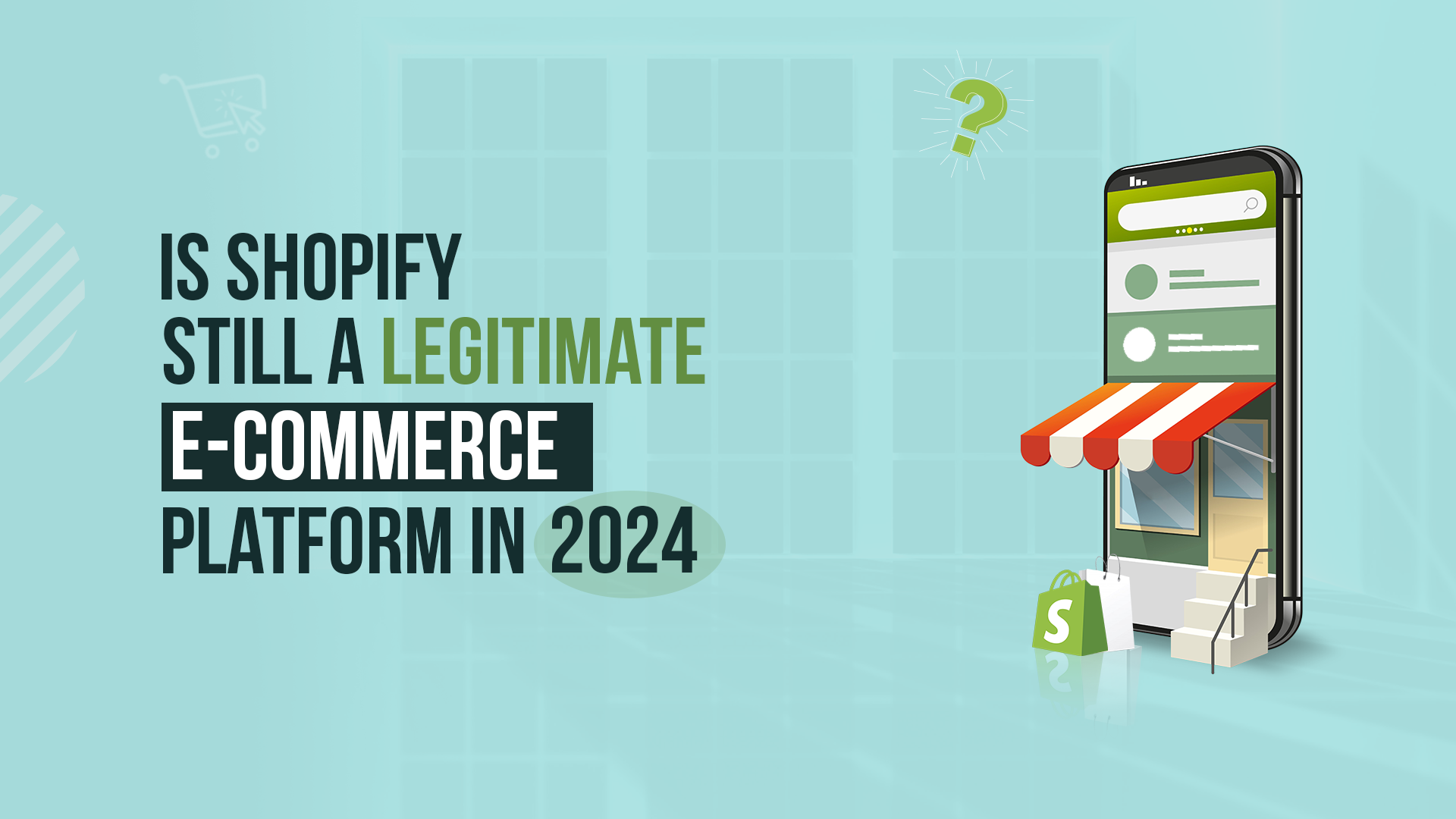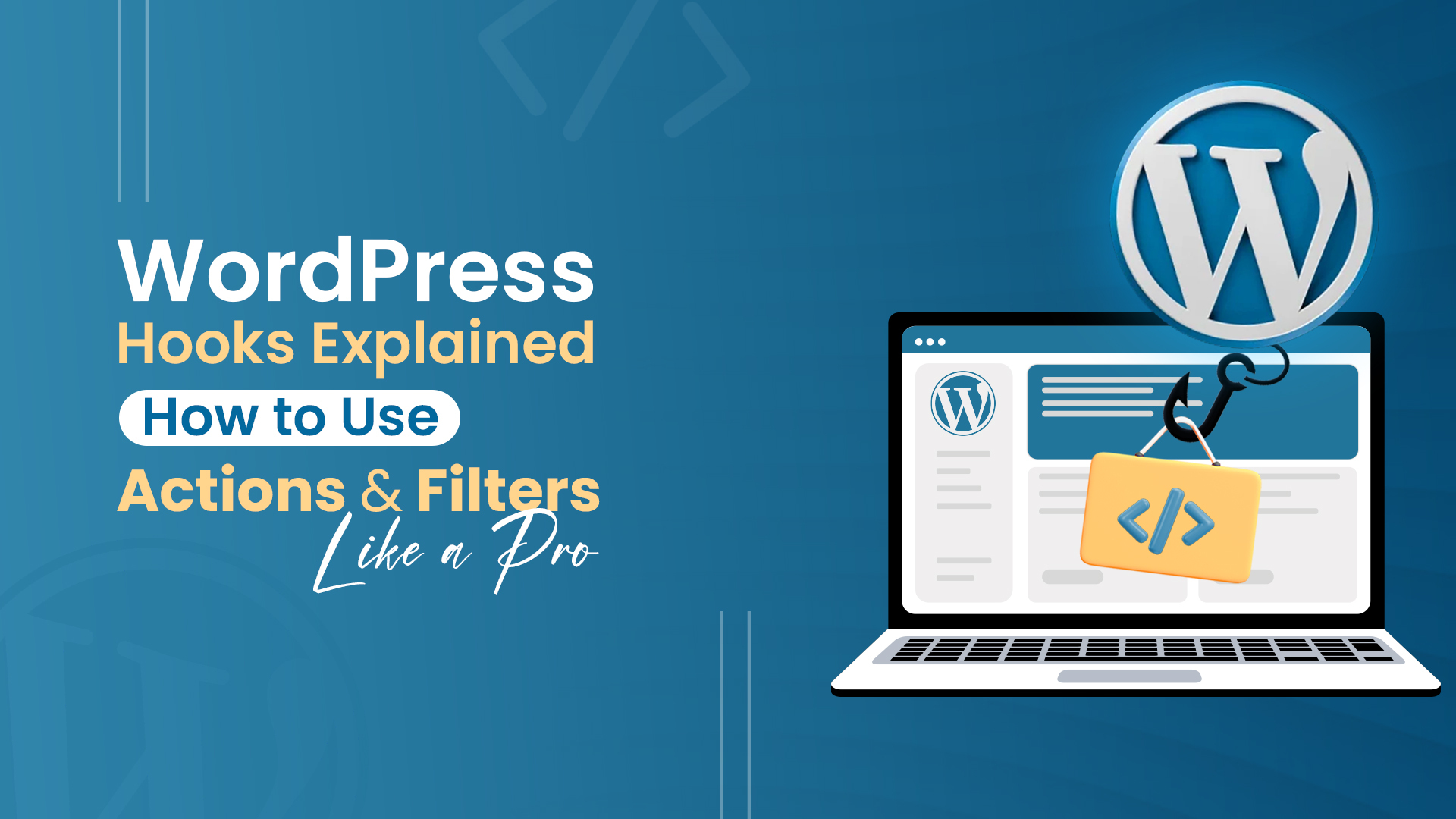Over the years, Shopify has established itself as a premier choice for entrepreneurs eager to build their digital presence. With renowned brands like Tesla, Sephora, and Netflix among its users, Shopify has solidified its reputation in the eCommerce world.
But is Shopify still a viable option in 2024? This is a valid question, especially for those exploring e-commerce solutions. The answer depends on your specific needs, technical skills, and long-term goals.
In this blog, we’ll evaluate whether Shopify remains a valuable choice for your business by exploring its advantages, disadvantages, and key features. Our aim is to provide a comprehensive assessment of Shopify’s suitability for your e-commerce needs in 2024.
Shopify Pros and Cons
Shopify is renowned for its user-friendly interface and extensive features, but it’s important to understand both its strengths and limitations:
Strengths
‒User-Friendly: Shopify’s platform is designed for ease of use, making it accessible even to those without technical expertise.
‒Scalable: Shopify accommodates businesses of all sizes, allowing you to grow without changing platforms.
‒Extensive Tools: From built-in functionalities to a broad app marketplace, Shopify offers tools for sales, marketing, and payment processing.
‒Reliable and Secure: Shopify handles hosting, server maintenance, and security, ensuring a smooth and secure operation.
‒Excellent Support: Shopify provides 24/7 customer support along with numerous guides and tutorials.
Potential Drawbacks and Solutions
‒Limited Design Customization: Shopify’s coding language (Liquid) can limit design options. However, many themes and third-party apps offer customization without needing extensive coding.
‒Reliance on Apps: Essential features often require paid apps. While these add to costs, they provide significant value and customization.
‒Checkout Customization Limits: Shopify’s default checkout process is optimized for conversions, but options for customization are limited.
‒No Email Hosting: Shopify doesn’t provide email hosting, so you’ll need a third-party service to manage your business email.
‒Complex Migration: Moving your store to or from Shopify can be complex. Planning and using migration tools can ease this process.
‒Third-Party Transaction Fees: Using external payment gateways incurs additional fees. Shopify Payments can help avoid these.
An In-depth Review of Shopify
- Shopify Pricing Plans
Shopify offers several pricing plans, each designed to meet the needs of different types of sellers.
a. Shopify Starter (formerly Shopify Lite)
Price: $5 per month (billed monthly)
Ideal for those looking to add e-commerce features to existing websites or social media platforms. Offers basic tools like payment acceptance and product management.
b. Shopify Basic
Price: $25 per month ($19 per month if billed annually)
Great for new sellers establishing an online presence. Includes customizable stores, built-in blogging, SSL security, and support for up to 3 international markets.
c. Shopify Standard
Price: $65 per month ($49 per month if billed annually)
Perfect for growing businesses needing advanced features. Includes everything in the Basic plan, plus lower transaction fees, advanced sales reports, and Point of Sale (POS) features.
d. Advanced Shopify
Price: $399 per month ($299 per month if billed annually)
Designed for large businesses and high-volume sellers. Features the lowest transaction fees, advanced shipping rate calculations, and up to 15 staff accounts.
e. Shopify Plus
Starting Price: $2,300 per month (on a 3-year term)
Ideal for complex businesses requiring custom solutions.

- Shopify’s Ease of Use
Shopify is widely recognized for its user-friendly design, making it an ideal platform for launching and managing an online store with minimal hassle.
Simple and Efficient Setup
A standout feature of Shopify is its straightforward and efficient setup process. The platform is designed to accommodate users of all experience levels, enabling you to get your online store operational quickly. Shopify’s intuitive interface and step-by-step setup guide make it accessible even for those new to e-commerce. This streamlined process allows entrepreneurs to concentrate on growing their business rather than dealing with complex configurations.Upon signing up, Shopify provides a personalized setup guide consisting of 7 steps. This allows you to complete each step at your own pace, tailoring your store to fit your specific needs.
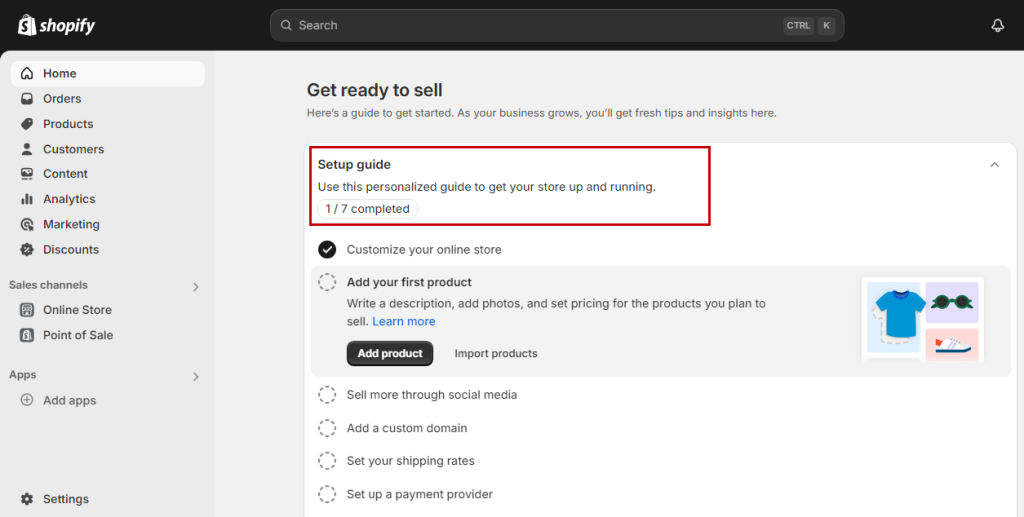
User-Friendly Website Builder
Shopify’s website builder is crafted to suit various skill levels. Whether you are a beginner or have some design experience, Shopify offers a variety of attractive and functional themes ready for use.

For those with limited web design experience, Shopify’s drag-and-drop tools simplify the customization process. You can easily adjust colors, fonts, and layouts with just a few clicks, ensuring your store mirrors your brand’s identity without requiring any coding knowledge.
Advanced Customization
For users with a technical background or specific design needs, Shopify provides advanced customization options through its Liquid template language. This feature allows for in-depth adjustments to your store’s design and functionality, offering a balance between ease of use and the flexibility to meet specialized requirements.
Ongoing Effort for Success
While Shopify simplifies the initial setup, building and maintaining a thriving online store demands continuous effort. Beyond the setup phase, store owners must invest in marketing strategies, design improvements, and possibly premium apps to enhance functionality and customer experience. To succeed in the competitive e-commerce landscape, it’s essential to develop effective marketing tactics and establish a strong brand identity.
- Shopify Themes
Shopify themes are crucial for crafting an engaging and effective online store. These pre-designed templates are instrumental in shaping your website’s appearance, usability, and functionality, helping you present your products and brand attractively.
Finding the Perfect Theme
The Shopify Theme Store provides a wide array of themes, which can be filtered by industry or style using the available drop-down menu. This feature helps you select themes that align with your business type or visual preferences. However, you’re not limited to themes designed exclusively for your industry. For instance, a technology store can effectively utilize a theme originally created for art or photography.
For those on a budget or just beginning, free themes offer a cost-effective solution while maintaining a professional appearance. Shopify’s collection of 12 free themes combines both style and functionality to help you get started.
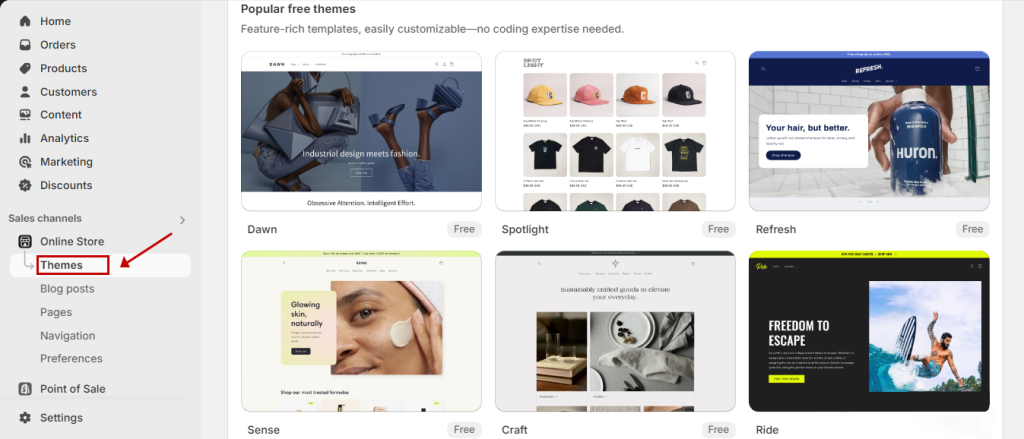
Customization Options
Shopify themes come with various customization options to suit different business needs. Whether you run a fashion boutique, a tech shop, or a store for handmade goods, you can choose a theme that reflects your brand’s style and identity. Themes are highly adaptable, allowing you to adjust layouts, color schemes, and typography to align with your brand.
Enhancing User Experience
Shopify prioritizes user experience (UX) in its themes, ensuring intuitive navigation for customers. Themes are designed to facilitate smooth browsing, product discovery, and shopping. With responsive design, your store will perform well across all devices, including desktops, tablets, and smartphones, providing a consistent and pleasant shopping experience.
Regular Updates and Support
Themes available in the Shopify Theme Store include regular updates and technical support. This ensures that your store remains compatible with the latest web standards and e-commerce functionalities, delivering a secure and optimal shopping experience for your customers.
Built to Drive Sales
Shopify themes are specifically designed to enhance e-commerce capabilities. They feature essential tools such as integration with payment gateways, inventory management systems, and marketing platforms. Advanced themes may offer additional features like 360-degree product views, video backgrounds, and interactive product filters, which can enhance the shopping experience and increase conversion rates.
Before finalizing your choice of theme, make use of the demo version. Click “View demo store” to see a live demonstration of how the theme performs in real-time.

- Shopify Integrations
Shopify integrations expand your store’s functionality by connecting it with a range of services and platforms. These integrations serve as extensions, enhancing your e-commerce operations and streamlining various processes.
Social Media Integrations
Shopify integrates seamlessly with several social media platforms, allowing you to sell products directly through these channels. This connectivity helps you engage with customers where they spend their time online and facilitates a more convenient shopping experience. Some of the supported social media platforms include:
★Facebook: Create a Facebook Shop to sell products directly on the platform.
★Instagram: Tag products in posts and stories, enabling users to shop directly from your Instagram feed.
★Pinterest: Utilize Buyable Pins, allowing customers to purchase products without leaving Pinterest.
★TikTok: Partner with TikTok to create shoppable ads and reach a younger audience.
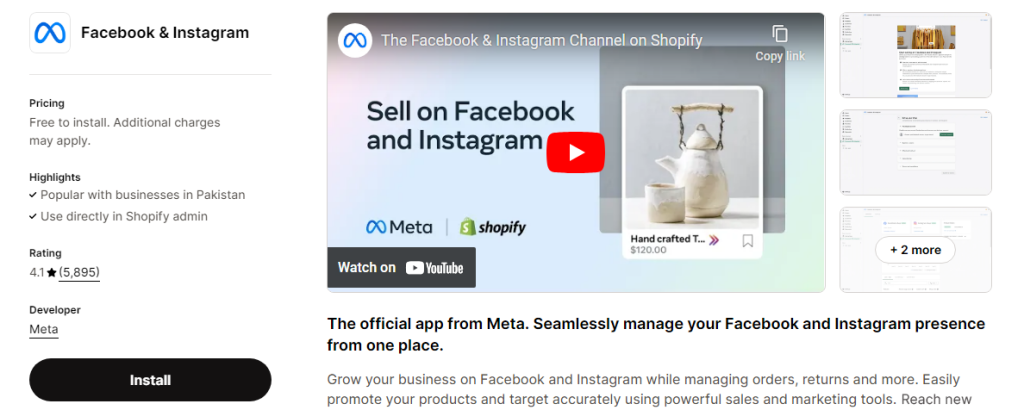
Pro Tip: While Twitter doesn’t offer a direct selling tool, it’s effective for marketing, customer engagement, and driving traffic to your Shopify store. Snapchat can also be used for brand promotion and creating ads that link back to your store.
Shopify Marketplace Connect App
The Shopify Marketplace Connect app simplifies the management of your product catalog across various online marketplaces. It enables you to sync your listings, orders, and inventory from your Shopify admin panel. Changes made in Shopify are automatically updated across all connected marketplaces.
Supported Marketplaces:
★Amazon
★Walmart (available in the United States only)
★eBay
★Etsy
This integration ensures consistency and efficiency across your sales channels, providing a unified approach to managing your e-commerce presence.
Print-on-Demand Dropshipping
Shopify’s print-on-demand integrations offer a cost-effective solution for managing inventory without upfront investments. You can add and test new products in your store without handling stock or shipping. Suppliers manage inventory and logistics, allowing you to focus on customer service and growth.
- Shopify Reports and Analytics
Shopify’s comprehensive reporting and analytics tools offer essential insights into your store’s performance. These tools help you make data-driven decisions to boost sales and enhance the customer experience. Here’s an overview of its key features:
‒Dashboard Overview: The Shopify dashboard provides a consolidated view of your store’s key metrics, including sales figures, order statistics, and traffic data. This overview allows you to monitor your business performance with ease.
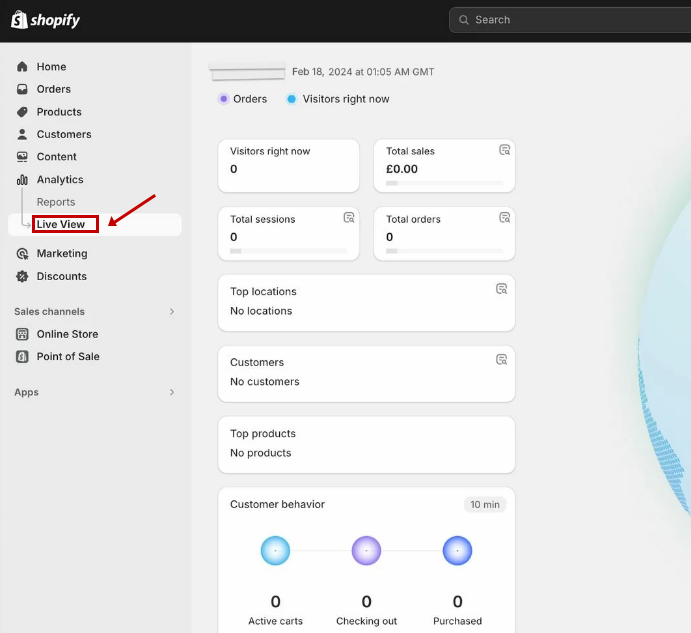
Sales Reports: Shopify’s sales reports enable you to analyze revenue trends, product performance, and order histories. These reports help you identify what drives your sales and how different products are performing. Shopify’s default sales reports can be customized to align with your specific business needs.
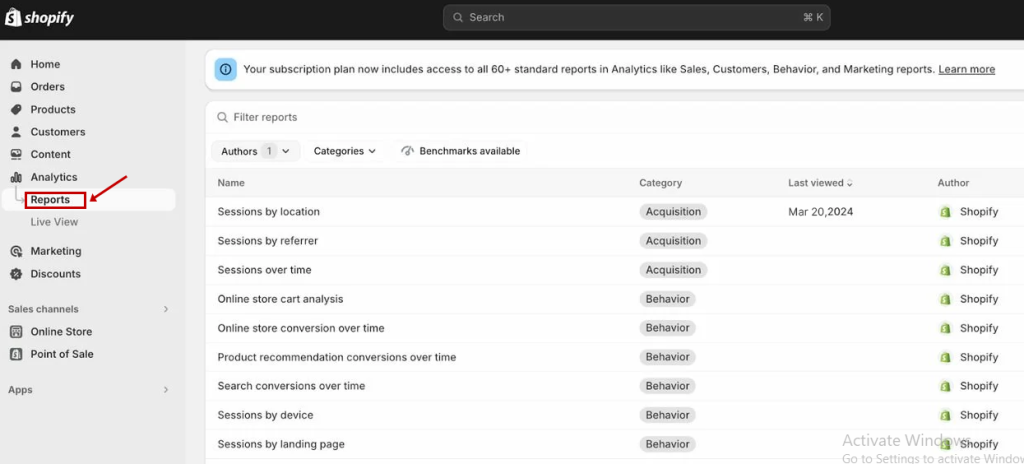
Types of Reports Available:
‒Marketing Reports: Evaluate the success of marketing campaigns and analyze traffic sources (e.g., social media, search engines, email marketing). Understand the impact of marketing strategies on sales and visitor behavior.
‒Sales Reports: Detailed breakdown of sales metrics, including total sales, top-selling products, and sales trends over time, including daily and seasonal variations.
‒Behavior Reports: Track visitor interactions, highlighting traffic sources, popular pages, time spent on site, and exit points for insights into user engagement.
‒Order Reports: Details transaction volumes, order statuses (paid, pending, refunded), and total sales over specific periods. Gain insights into customer behavior, such as repeat purchases and top-rated products.
Additional Reports Include:
‒Additional Reports Include:
‒Online store cart analysis
‒Profit reports
‒Profit by point of sale location
‒Finance reports
‒Returning customers analysis
‒Top online store searches
‒Retail sales by product
‒Store conversion rates
‒Acquisition reports
‒Inventory reports
‒Online store speed analysis
‒Refund rate
- Shopify SEO and Marketing
Effective SEO (Search Engine Optimization) and marketing strategies are essential for enhancing your online visibility and driving traffic to your Shopify store.
User-Friendly SEO Framework
Shopify is designed with SEO in mind, providing a range of features to boost your store’s search engine visibility. Key SEO elements include optimizing product descriptions, refining site structure, and ensuring fast loading times on all devices. These factors are critical for achieving high rankings in search engines like Google.
Shopify SEO Apps
Boost your SEO efforts with Shopify SEO apps, which are designed to increase organic traffic, improve page speed, and boost your search engine rankings.
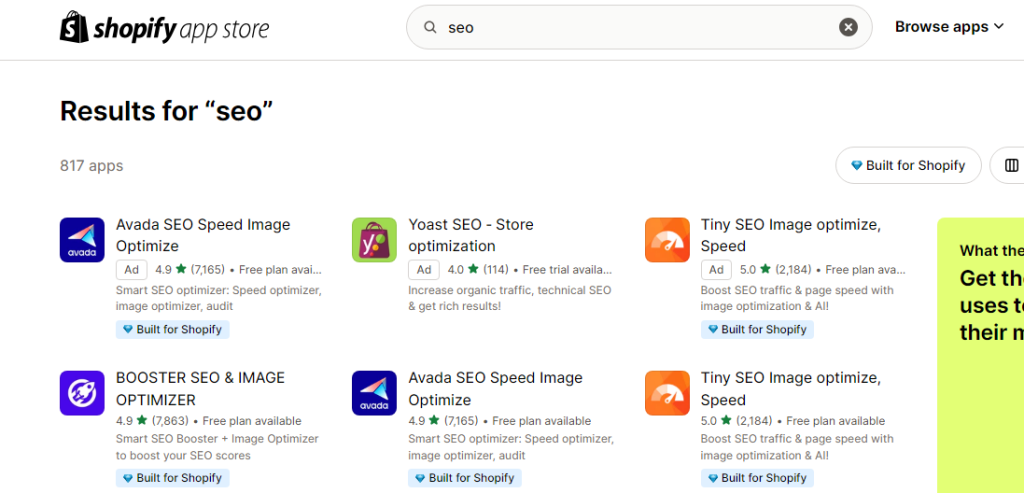
Read our blog here to Increase sales and conversion of your shopify store.
Meta Titles and Descriptions
Shopify allows you to easily customize meta titles and descriptions, which are vital for attracting clicks from search engine results pages. While meta descriptions don’t directly affect rankings, they play a crucial role in encouraging users to visit your site.
How to Edit Meta Descriptions in Shopify:
a. Log in to your Shopify admin panel.
b. Go to Online Store > Pages.
c. Select Add Page.
d. Add your meta title and description.
Well-crafted meta descriptions can enhance your click-through rates. According to SEO expert Neil Patel, “Meta descriptions are important because they help Google’s algorithm determine page relevance for specific keywords. Optimized metadata can positively influence your search rankings.”
Blogging
Shopify’s built-in blogging platform enables you to create and publish high-quality, relevant content that supports your SEO strategy. Regular blogging not only engages your audience but also attracts new visitors through organic search. This feature helps establish your brand’s authority and drive more traffic to your store.
- Shopify Support
Shopify is known for its exceptional support services, offering comprehensive assistance to ensure your online store runs smoothly. Whether you need help troubleshooting technical issues, optimizing your store, or have general queries, Shopify’s support team is available 24/7.
Support Channels
Shopify provides multiple support channels, including phone, email, and live chat, connecting you with knowledgeable experts ready to assist you at any time. This round-the-clock support is designed not only to resolve issues but also to provide peace of mind, knowing expert help is always within reach.
Shopify’s commitment to high-quality information and fast response times ensures that all business owners receive reliable and effective assistance, setting Shopify apart from many competitors.
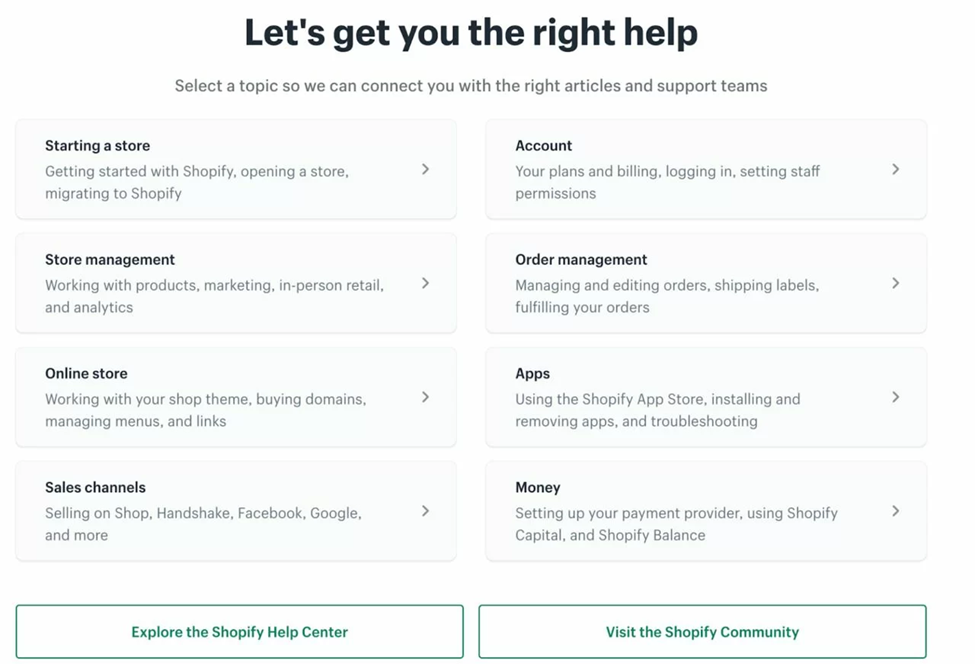
- Shopify Security
In the digital world, strong security measures are crucial for any online business. Shopify excels in this area, providing comprehensive security features to protect both merchants and customers. By choosing Shopify, you can focus on growing your business without worrying about the complexities of online security.
Key Security Features
‒SSL Certificates: Shopify provides all stores with SSL Certificates, ensuring that data transferred between your website and your customers is encrypted. This includes sensitive information such as credit card details, which enhances your store’s credibility and builds customer trust.
‒PCI Compliance: Shopify complies with PCI (Payment Card Industry) Data Security Standards, guaranteeing the highest level of security for handling credit and debit card information. This compliance underscores Shopify’s commitment to maintaining top-tier security measures.
‒Cookie Policy Generator: Shopify includes a cookie policy generator to help manage privacy and comply with data protection regulations, further strengthening your store’s security and compliance.
With Shopify, security is a foundational element of the platform, allowing you to operate with confidence while benefiting from industry-leading protection measures.
Is Shopify Worth It?
Absolutely. Shopify stands out as a valuable platform for small businesses seeking a user-friendly and scalable e-commerce solution. Its intuitive interface, customizable themes, and comprehensive suite of sales tools make it an excellent choice for establishing and growing an online presence. Despite the monthly subscription fee, Shopify’s reliability, strong security measures, and 24/7 customer support provide significant value. For small businesses aiming to expand their online reach efficiently, Shopify is a worthwhile investment.
Shopify also excels in various business models, including dropshipping and traditional retail. The platform’s seamless integration with numerous dropshipping apps and its direct connections to popular marketplaces streamline product importation and order fulfillment. Shopify’s ease of use and scalability make it ideal for entrepreneurs looking to launch and grow a business.
To maximize revenue, focus on selecting a profitable niche, designing an appealing store, offering a compelling product range, employing strategic marketing, and providing excellent customer service.
Wrapping Up: Is Shopify Right for You?
As we conclude our review of Shopify, it’s crucial to assess whether this platform aligns with your e-commerce goals. Shopify offers a solid foundation for both new and growing businesses, characterized by its ease of use, extensive features, and growth potential. However, if you have specific customization needs, concerns about additional costs, or a tight budget, exploring other platforms might be beneficial.
Evaluate Shopify’s features in relation to your business requirements and objectives to make an informed decision. If simplicity, a wide range of add-ons, and scalability are important to you, Shopify could be the perfect fit. Otherwise, consider alternative platforms that may better suit your needs.
If you are a new store owner and need tips for a successful shopify store then read our blog top shopify tips every new store owner should know in 2024.
